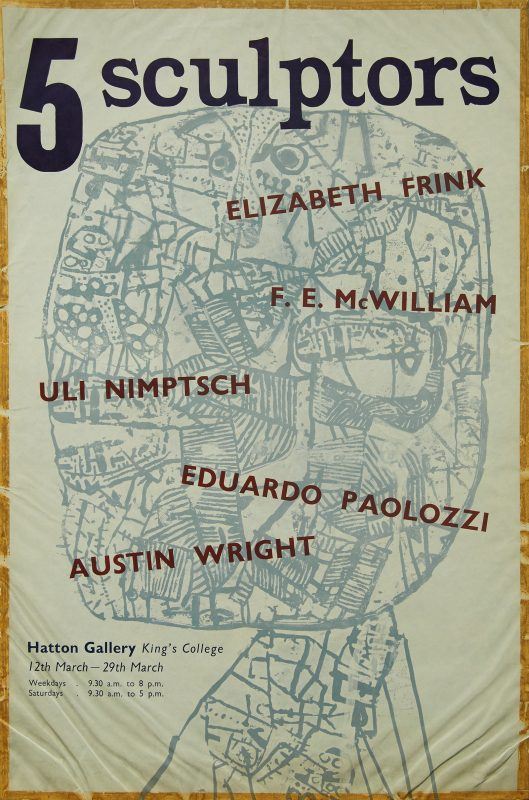1957
This long decade marks the tenure of Lawrence Gowing as Professor of Fine Art and the establishment of new and vigourous programmes of exhibtions, acquisitions and teaching.
By 1954 Victor Pasmore and Richard Hamilton were established as members of staff, joining longer-serving staff such as Leonard Evetts, Murray McCheyne, Louisa Hodgson and art historian Ralph Holland.
Exhibitions
-
Samuel Palmer and his Circle
26 January - 16 February 1957
-
New Trends in Painting
14 February - 7 March 1957New Trends in Painting
-
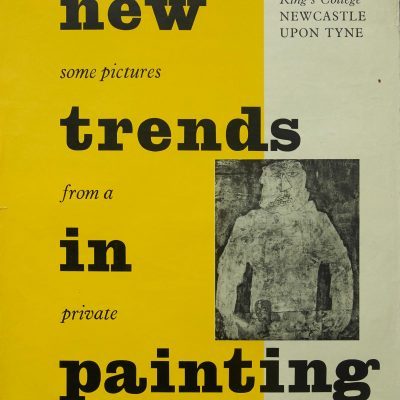
Poster for New Trends in Painting
-
-
Five Sculptors
12 - 29 March 1957Five Sculptors
-
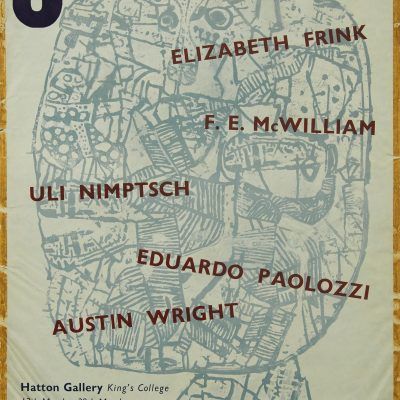
Poster for Five Sculptors
-
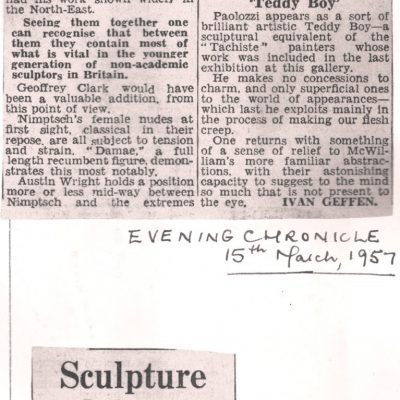
Local press coverage for 5 Sculptors
-
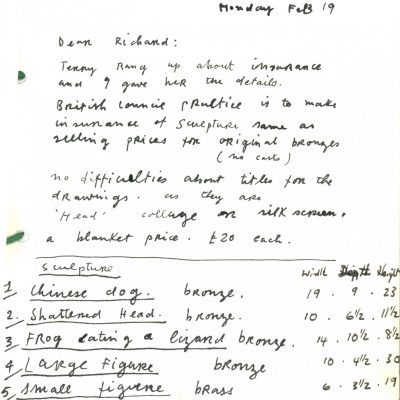
Letter from Paolozzi to Hamilton
-
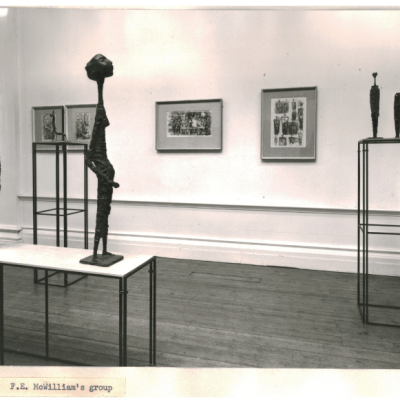
Installation shots of 5 Sculptors
-
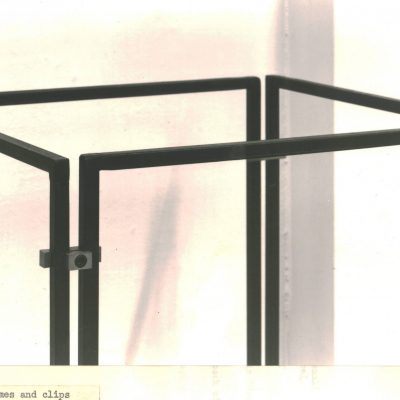
Hamilton's open frame plinths
-
-
Basic Form and Colour
May 1957Basic Form and Colour
-
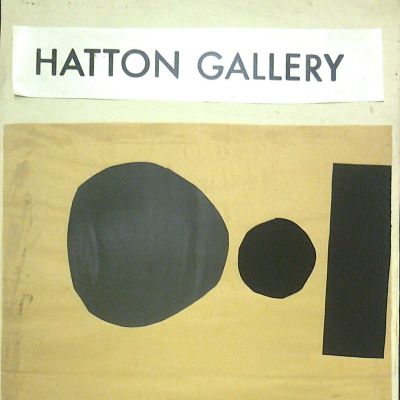
Poster for Basic Form and Colour
-
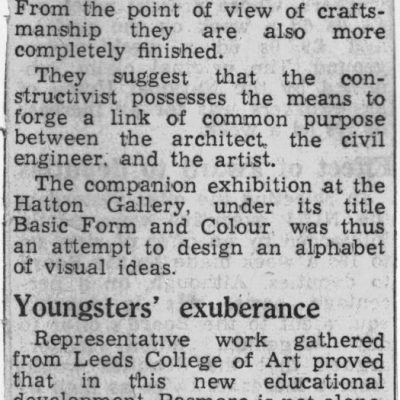
Press review
-
-
Classical Antiquities
9 - 16 April 1957
-
Post-War Church Building
16 - 29 April 1957
-
Art Education exhibition
May 1957Art Education exhibition
-
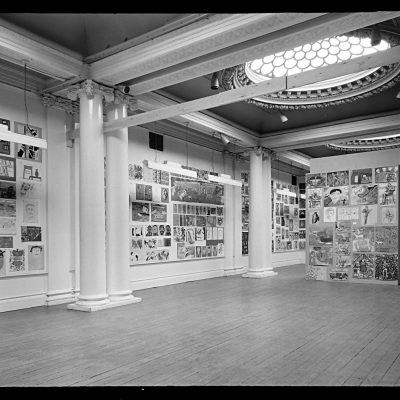
Installation view of the Art Education Exhibition
-
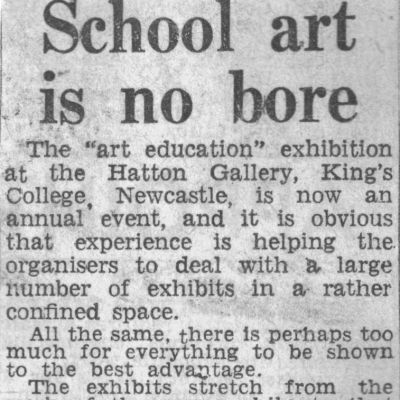
Desmond Bland’s supportive review
-
-
Quentin Bell
11-20 May 1957
-
an Exhibit
3 - 18 June 1957an Exhibit
-
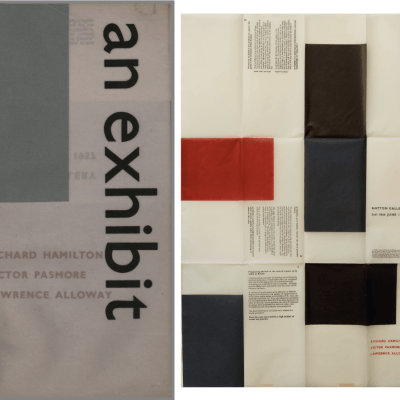
Hamilton’s poster/catalogue for ‘an Exhibit’
-
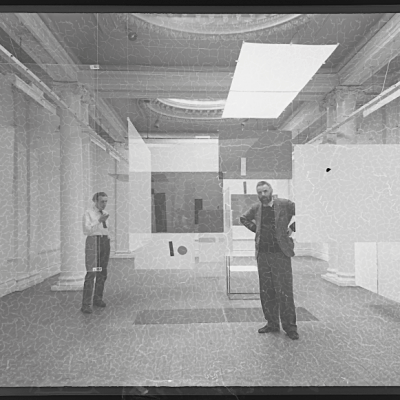
Installation views of ‘an Exhibit’
-
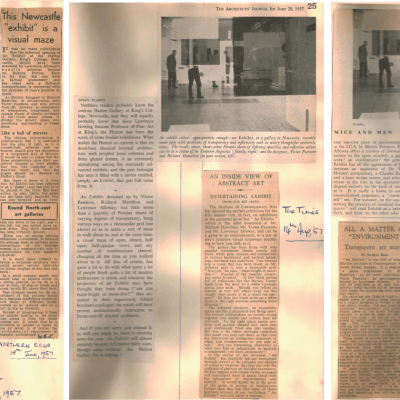
‘an Exhibit’ press reviews
-
-
Student Exhibition
24 June - 4 July 1957
-
Medical Illustration and the School of Fontainebleau
10 July - 19 July 1957Medical Illustration and the School of Fontainebleau
-
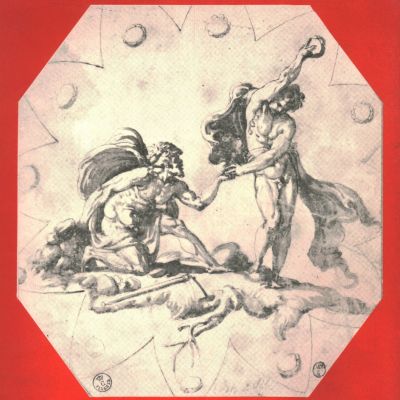
Catalogue cover for Medical Illustration and the School of Fontainebleau
-
-
Permanent Collection
27 July - 24 August 1957
-
The Landscape of Industry
2 - 7 September 1957The Landscape of Industry
-
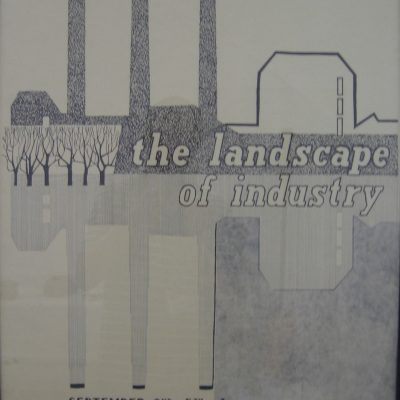
Poster for The Landscape of Industry
-
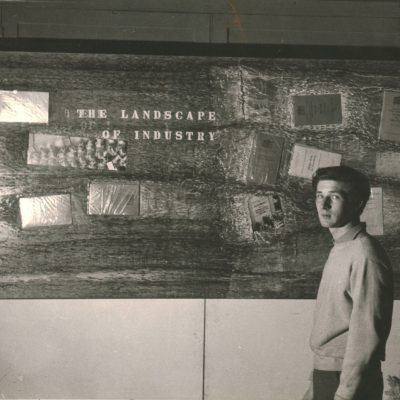
Ian Stephenson in the exhibition
-
-
The College Plans Exhibition
23 September - 5 October 1957
-
Martin Bloch. Paintings and Drawings (also bookbindings by Fiona Campbell)
12 October - 2 November 1957Martin Bloch. Paintings and Drawings (also bookbindings by Fiona Campbell)
-
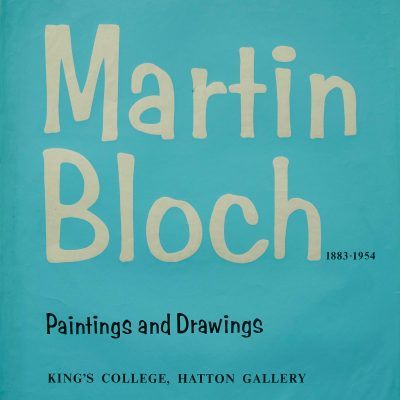
Poster for the Martin Bloch exhibition
-
-
Indian paintings from Rajasthan
9 - 30 November 1957
-
Gods and Men. An exhibition of sculpture from Northumberland and Durham
3 - 24 December 1957Gods and Men. An exhibition of sculpture from Northumberland and Durham
-
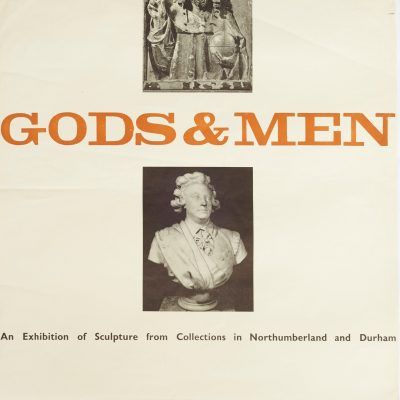
Poster for Gods & Men
-
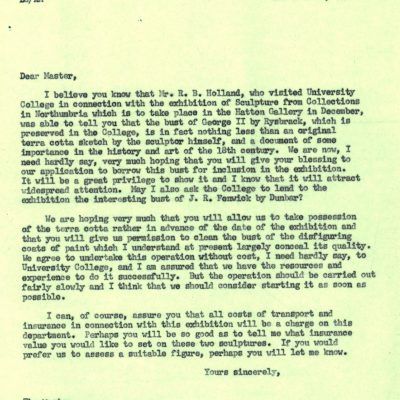
Letter from Lawrence Gowing
-
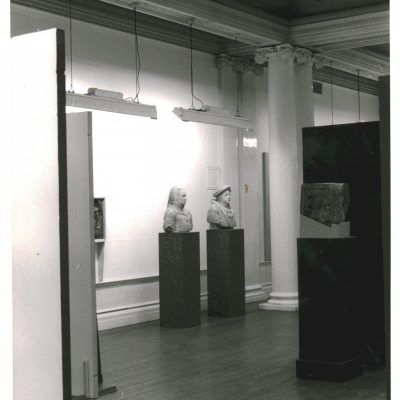
Installation view of Gods & Men
-
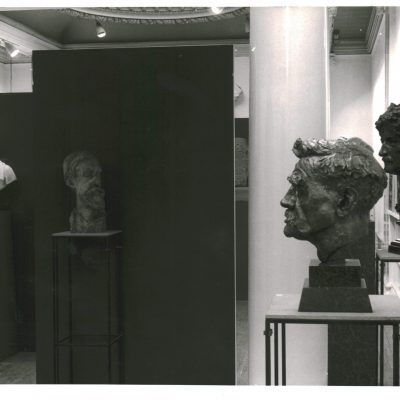
Roubiliac’s marble bust of Newton
-
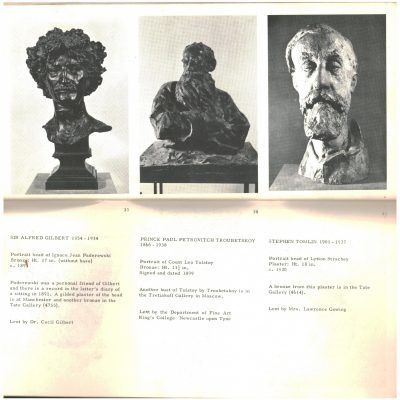
Spread from the Gods & Men catalogue
-
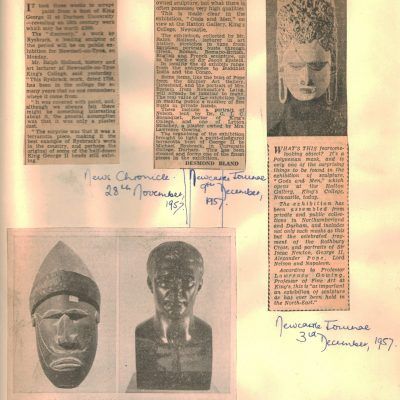
Gods & Men press cuttings
-
Staff / Students
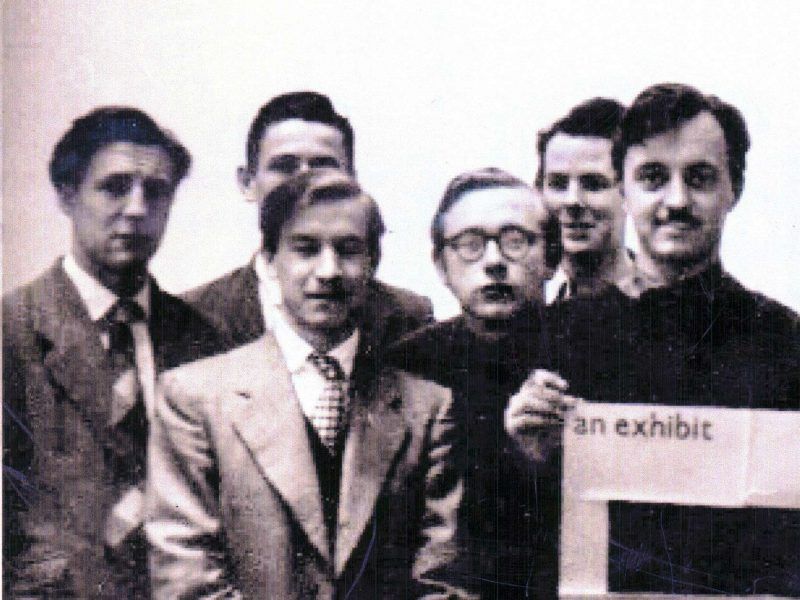
1957, an Exhibit
Derek Carruthers seen holding the poster for An Exhibit alongside a group of fellow students.
Student alumnus Matt Rugg (1956-61) recalls An Exhibit.
https://soundcloud.com/user-578681853/matt-rugg-007
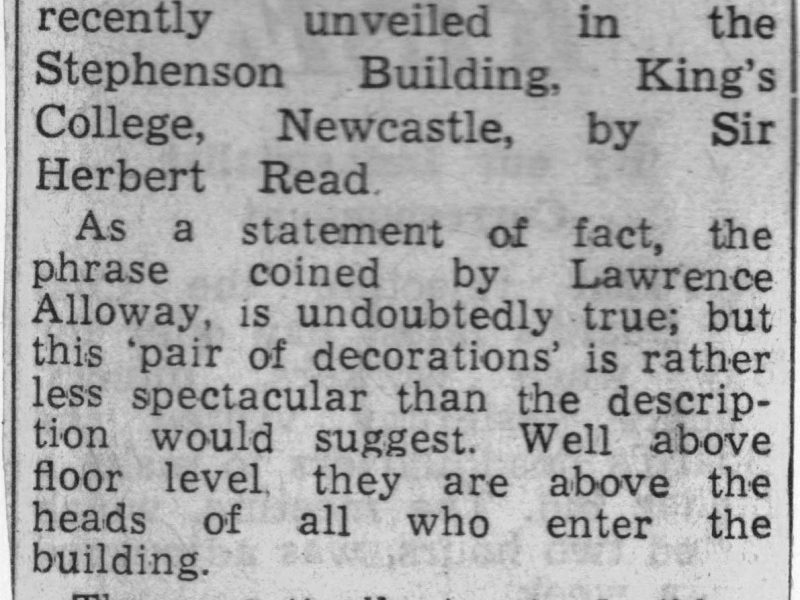
1957, press report on Pasmore’s murals
As reported here, in May 1957 Pasmore completed two large murals for the Stephenson engineering building on the Newcastle campus, unveiled by Herbert Read. This event was accompanied by an exhibition in the Hatton titled ‘Basic Form and Colour’, described by W.E. Johnson as an attempt ‘to design an alphabet of visual ideas’.
Student alumnus Derek Carruthers (1953-57) describes Pasmore’s views on art and architecture.
https://soundcloud.com/user-578681853/derek-carruthers-007
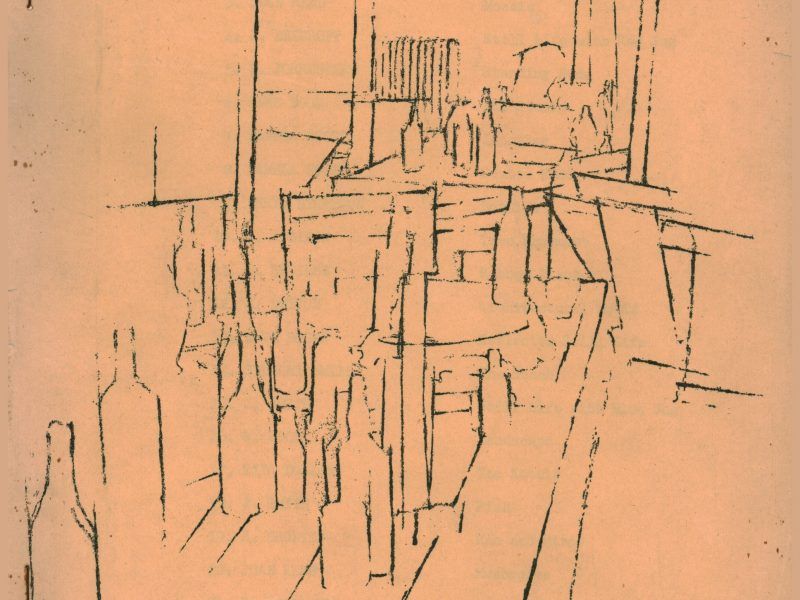
1957, Student Summer Exhibition, catalogue
The cover of the 1957 Student Summer Exhibition catalogue by Kathleen Brown (Kate Stephenson) demonstrates that drawing from life, though with a difference, remained an important part of the course.
In 1957 the external examiners were William Coldstream and John Piper.
Student alumni Matt Rugg (1956-61) and Pat Kremer (1957-61) recall Ian Stephenson’s influence.
https://soundcloud.com/user-578681853/sets/matt-rugg
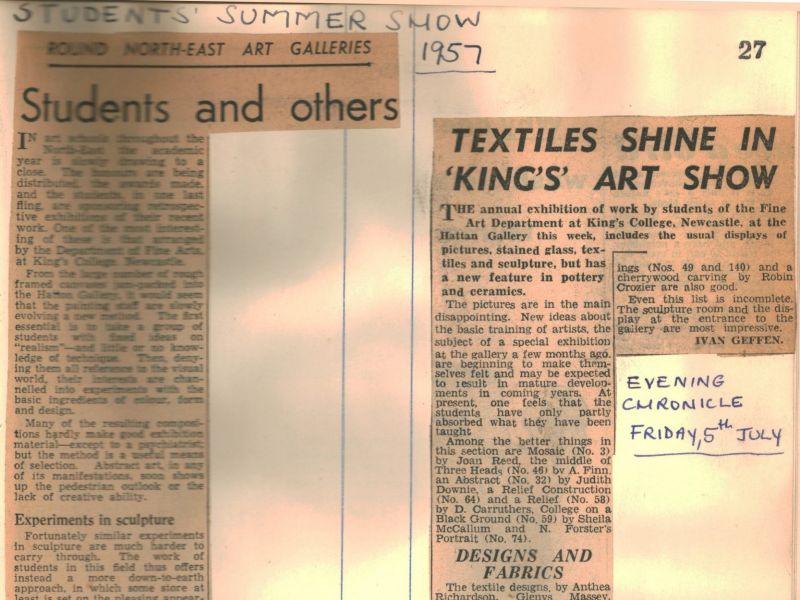
1957, Student Summer Exhibition, press reviews
In these reviews W.E Johnson and Ivan Geffen both pick up on the possible difficulties of students, and particularly painters, of adapting to the new ‘basic course’. Johnson writes of students denied all reference to the visual world and ‘channelled into experiments with the basic ingredients of colour form and design’, while Geffen felt that ‘at present one feels that the students have only partly absorbed what they have been taught.’
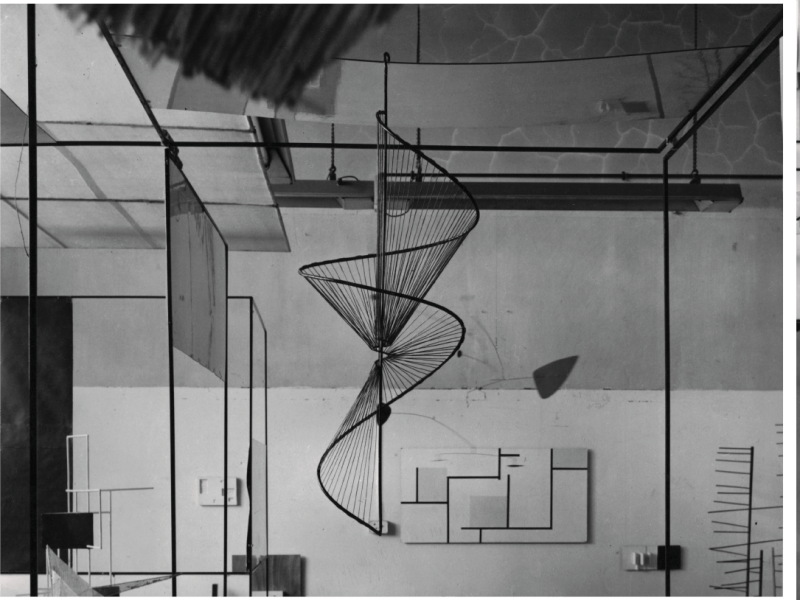
1957, ‘Room 2’ photograph
These two photographs show a display of students’ works in ‘Room 2’. The ‘Room 2’ group at this time was made up of students apparently favoured by Pasmore and making works that adhered to his abstract leanings. Prominent is Derek Carruthers’ spiral mobile that Pasmore had included in the 1956 Abstracts exhibition. The metal framework used for Hamilton’s Man, Machine and Motion exhibition can be seen here being enterprisingly re-used.
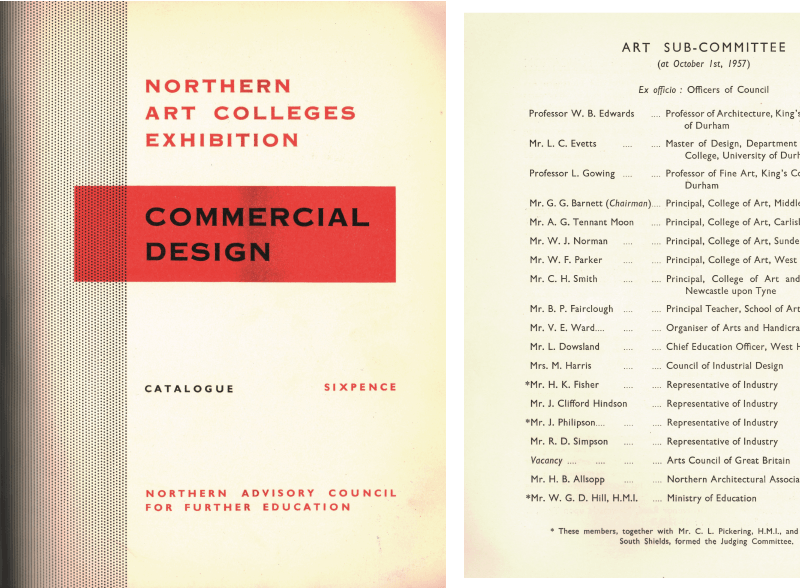
1957, Commercial Design exhibition catalogue
As the reputation of the Kings’ College Fine Art Department developed through the 1950s staff became involved with various external organisations and initiatives. This catalogue of student work in Commercial Design from Northern Art Colleges was organised by the Northern Advisory Council for Further Education. On their Art Committee sat Lawrence Gowing and Leonard Evetts from the Fine Art Department as well as Professor of Architecture, W.B. Edwards.
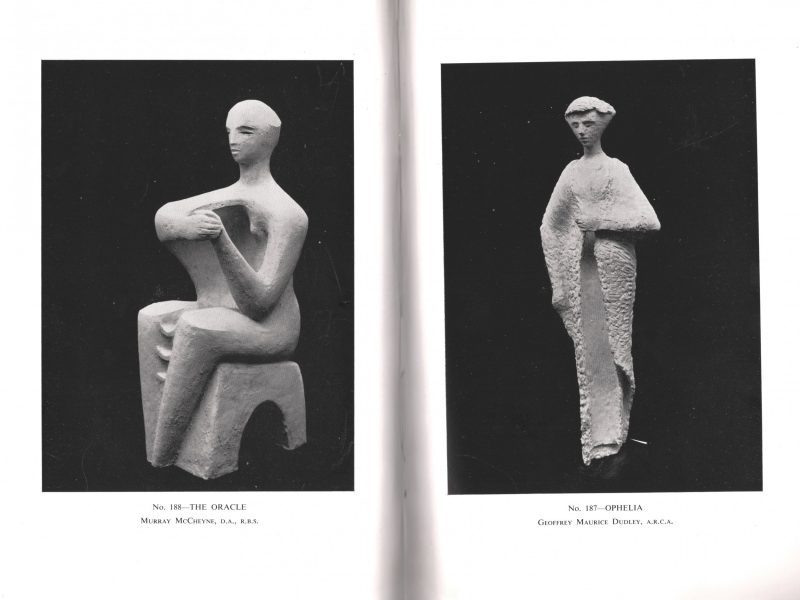
1957, catalogue for an ‘Exhibition of Works by Artists of the Northern Counties’
Staff and students were often included in exhibitions beyond the University, this spread showing works by sculpture tutors Murray McCheyne and Geoffrey Dudley is from the catalogue for an ‘Exhibition of Works by Artists of the Northern Counties’ held at the Laing Art Gallery. Leonard Evetts was also included, as well as students Scott Campbell, Noel Forster, Brian Sefton, Ronald Dutton and Robin Crozier.
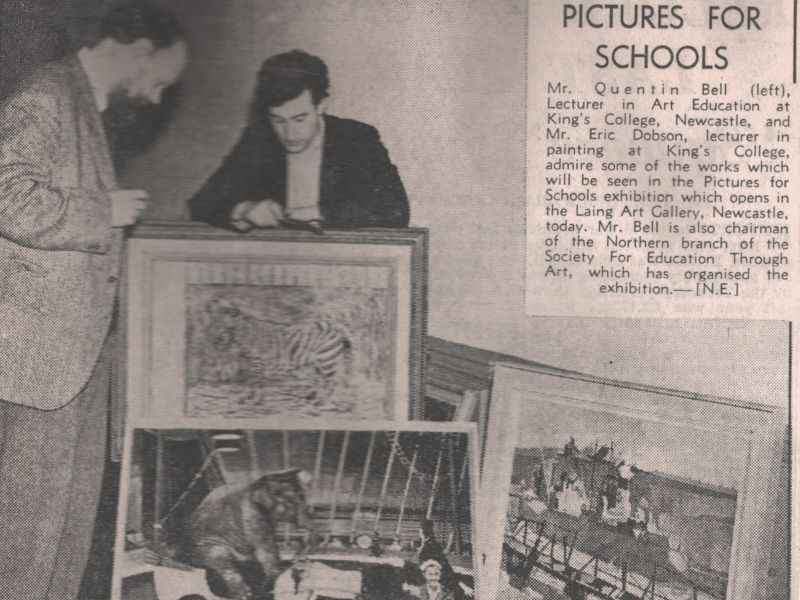
1957, staff press cutting
King’s College lecturers Quentin Bell and Eric Dobson are seen here at the Laing Art Gallery assisting with the Pictures for Schools exhibition held there.
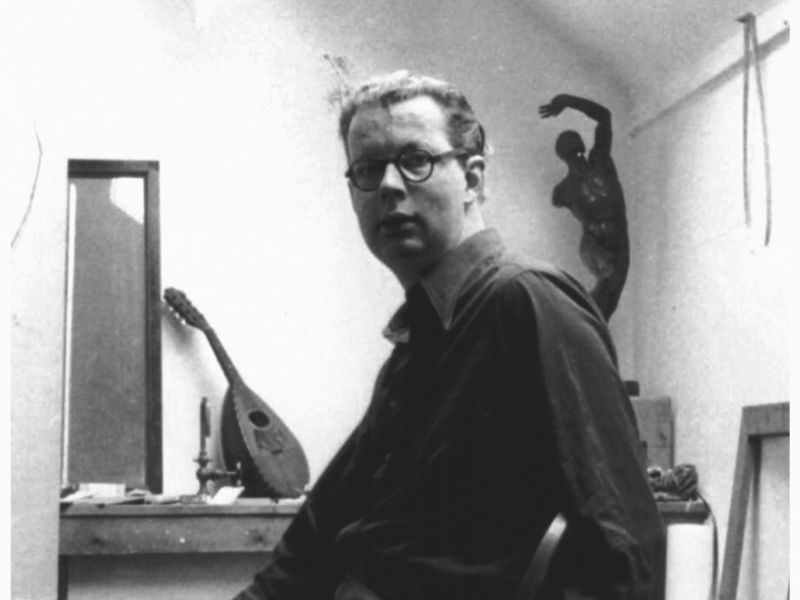
1957, Professor Lawrence Gowing, studio photograph
This photograph of Professor Lawrence Gowing taken in the studios in the Fine Art Department in 1957 appeared in the catalogue for his exhibition held in the Hatton Gallery in 1983. When in 1948 he was appointed as Professor of Fine Art at Kings College, he was only 30, four years later he was awarded a CBE and made a Trustee of the Tate Gallery.
Student alumna Mary Webb (1958-63) describes Gowing’s qualities.
https://soundcloud.com/user-578681853/mary-webb-008
Acquisitions
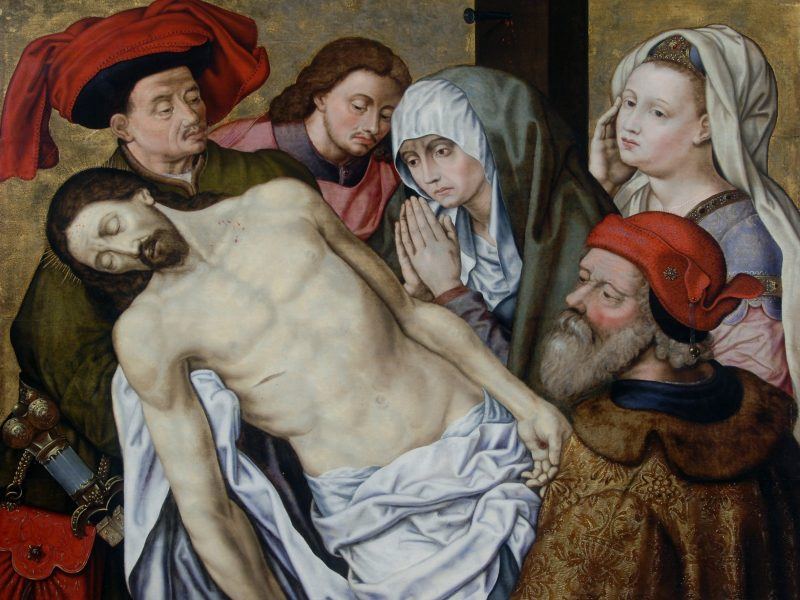
The Lamentation, 1600
Hugo van der Goes
After Hugo van der Goes (c.1440-1482) - 'The Lamentation'.
NEWHG : OP.0047. Oil on panel purchased from Anderson and Garland Ltd, 1957.
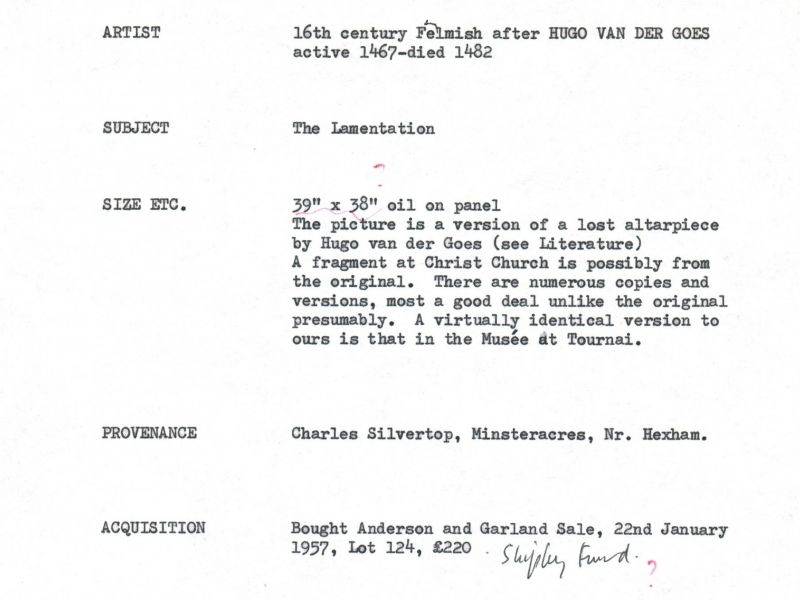
1960s record sheet for ‘The Lamentation’
Hugo van der Goes
Unusually two old master works were acquired locally rather than through London dealers or auctioneers. Both this painting and the Jacob de Wit had belonged to the Silvertop family of Minsteracres. In 1950 Charles Silvertop had sold the family home for conversion into a religious retreat, and a few years later he sold much of his art collection. Similarly to ‘The Descent from the Cross’ attributed to Domenichino, also in the Hatton Collection, numerous versions of this image, from the 16th and 17th centuries, can be found across Europe, the nearest being in the Bowes Museum collection.
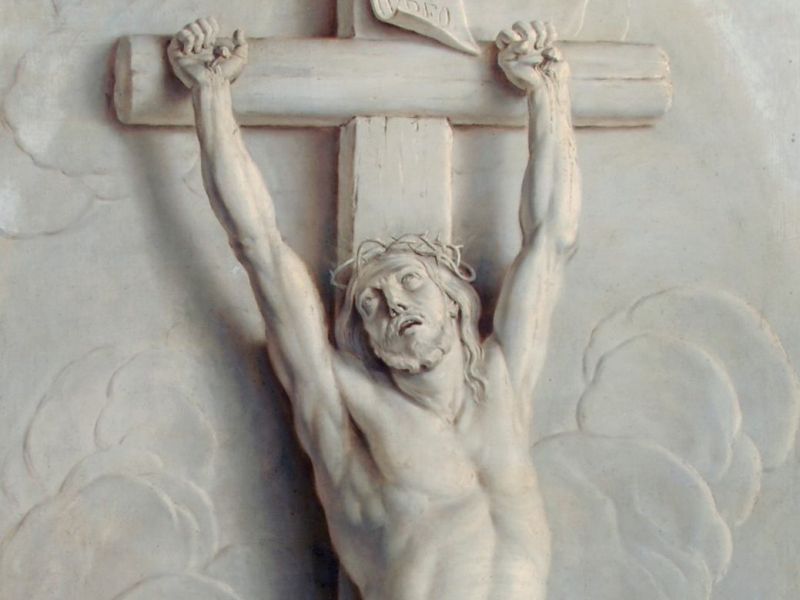
Christ on the Cross, 1720
Jacob de Wit
Jacob de Wit (1695-1754) - 'Christ on the Cross', c.1720.
NEWHG : OP.0073. Oil on canvas purchased from Anderson and Garland Ltd, 1957.
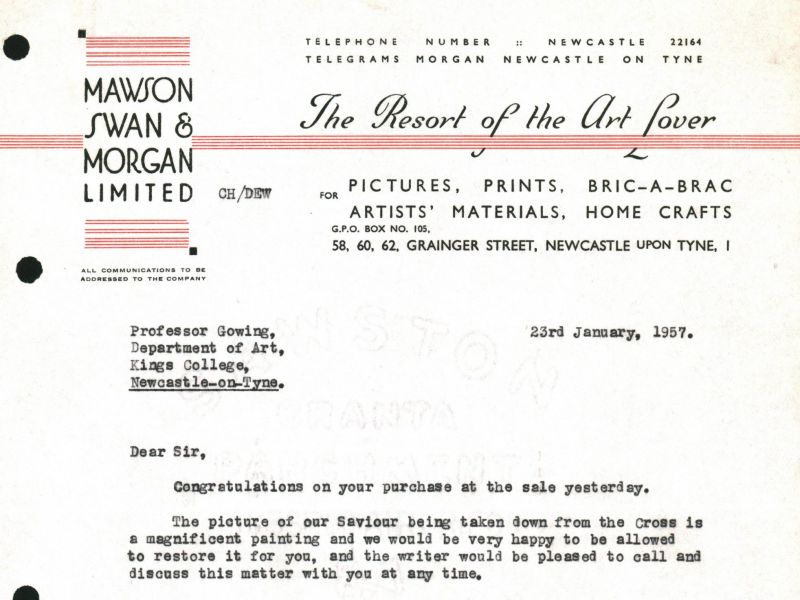
Letter from Mawson, Swan & Morgan Ltd, 1957
Lawrence Gowing
Also purchased from the Silvertop sale at Anderson & Garland, the required restoration work on the painting was also undertaken locally, as this wonderfully formal letter from Mawson, Swan & Morgan Ltd confirms. This grisaille painting, imitating the effect of a relief sculpture, would originally have been painted for a specific architectural setting.
